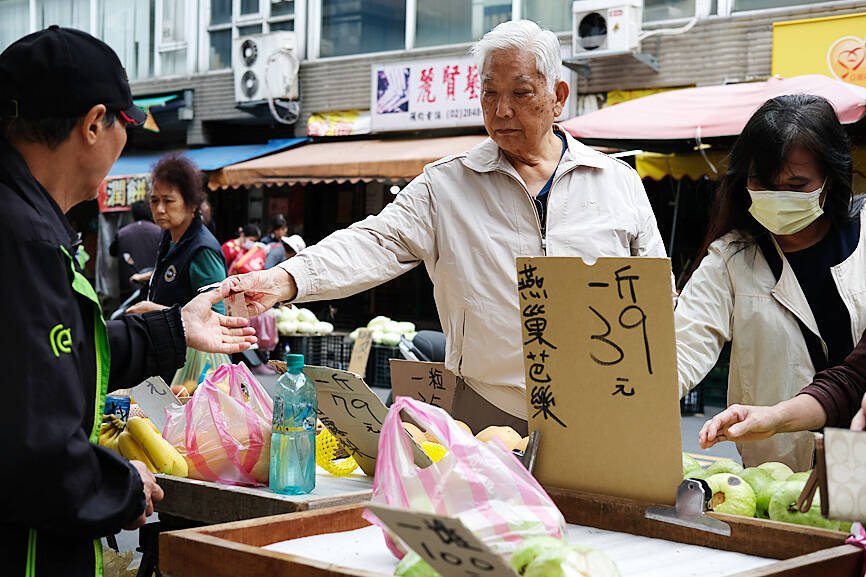The consumer price index (CPI) last month grew 1.69 percent from a year earlier, the lowest in 3.5 years and below the central bank’s 2 percent target for the second straight month, as food, service and shelter prices rose at a moderate pace, the Directorate-General of Budget, Accounting and Statistics (DGBAS) said yesterday.
“Consumer prices held generally stable and displayed no signs of an evident upswing going forward, although service charges remained elevated,” DGBAS official Tsao Chih-hung (曹志弘) said.
The inflation gauge might climb higher this month due to Typhoon Kong-rey, but is unlikely to exceed 2 percent, as autumn and winter are harvest season, Tsao said.

Photo: CNA
Food costs, the largest chunk of the CPI weighting, gained 2.7 percent year-on-year, as storms and heavy rainfalls damaged crops, pushing up fruit and vegetable prices, Tsao said.
However, prices for the 17 critical livelihood items the government monitors declined by 0.62 percent year-on-year to the lowest level in 56 months, he said.
Core CPI, a preferred long-term price tracker by the central bank because it excludes volatile items, expanded 1.64 percent, the statistics agency said.
Still, people might feel the pinch more acutely because rents advanced 2.5 percent from a year earlier and eating-out costs moved up 2.96 percent, Tsao said.
Tsao dismissed worry over an upcoming resurgence of inflation following former US president Donald Trump’s electoral victory, saying that it would take several months for policy changes, if any, to affect commodity prices.
Moreover, end-market demand for fuel and raw materials appeared soft, judging from the latest trade data, he added.
This followed a 0.69 percent drop in last month’s producer price index (PPI), a measure of the price movements of goods from a seller’s perspective, thanks to falling prices of oil, coal, electronics and chemical products amid weak market demand, the DGBAS said.
The PPI trajectory also reflected an imbalanced recovery in Taiwan’s economy, where suppliers of electronics used in artificial intelligence are flourishing, but non-tech manufacturers have wobbled.
In the first 10 months of this year, the CPI picked up 2.19 percent, while the PPI rose 1.23 percent from a year earlier, the DGBAS said.

When an apartment comes up for rent in Germany’s big cities, hundreds of prospective tenants often queue down the street to view it, but the acute shortage of affordable housing is getting scant attention ahead of today’s snap general election. “Housing is one of the main problems for people, but nobody talks about it, nobody takes it seriously,” said Andreas Ibel, president of Build Europe, an association representing housing developers. Migration and the sluggish economy top the list of voters’ concerns, but analysts say housing policy fails to break through as returns on investment take time to register, making the

EARLY TALKS: Measures under consideration include convincing allies to match US curbs, further restricting exports of AI chips or GPUs, and blocking Chinese investments US President Donald Trump’s administration is sketching out tougher versions of US semiconductor curbs and pressuring key allies to escalate their restrictions on China’s chip industry, an early indication the new US president plans to expand efforts that began under former US president Joe Biden to limit Beijing’s technological prowess. Trump officials recently met with their Japanese and Dutch counterparts about restricting Tokyo Electron Ltd and ASML Holding NV engineers from maintaining semiconductor gear in China, people familiar with the matter said. The aim, which was also a priority for Biden, is to see key allies match China curbs the US

NOT TO WORRY: Some people are concerned funds might continue moving out of the country, but the central bank said financial account outflows are not unusual in Taiwan Taiwan’s outbound investments hit a new high last year due to investments made by contract chipmaker Taiwan Semiconductor Manufacturing Co (TSMC, 台積電) and other major manufacturers to boost global expansion, the central bank said on Thursday. The net increase in outbound investments last year reached a record US$21.05 billion, while the net increase in outbound investments by Taiwanese residents reached a record US$31.98 billion, central bank data showed. Chen Fei-wen (陳斐紋), deputy director of the central bank’s Department of Economic Research, said the increase was largely due to TSMC’s efforts to expand production in the US and Japan. Investments by Vanguard International

STRUGGLING TO SURVIVE: The group is proposing a consortium of investors, with Tesla as the largest backer, and possibly a minority investment by Hon Hai Precision Nissan Motor Co shares jumped after the Financial Times reported that a high-level Japanese group has drawn up plans to seek investment from Elon Musk’s Tesla Inc to aid the struggling automaker. The group believes the electric vehicle (EV) maker is interested in acquiring Nissan’s plants in the US, the newspaper reported, citing people it did not identify. The proposal envisions a consortium of investors, with Tesla as the largest backer, but also includes the possibility of a minority investment by Hon Hai Precision Industry Co (鴻海精密) to prevent a full takeover by the Apple supplier, the report said. The group is